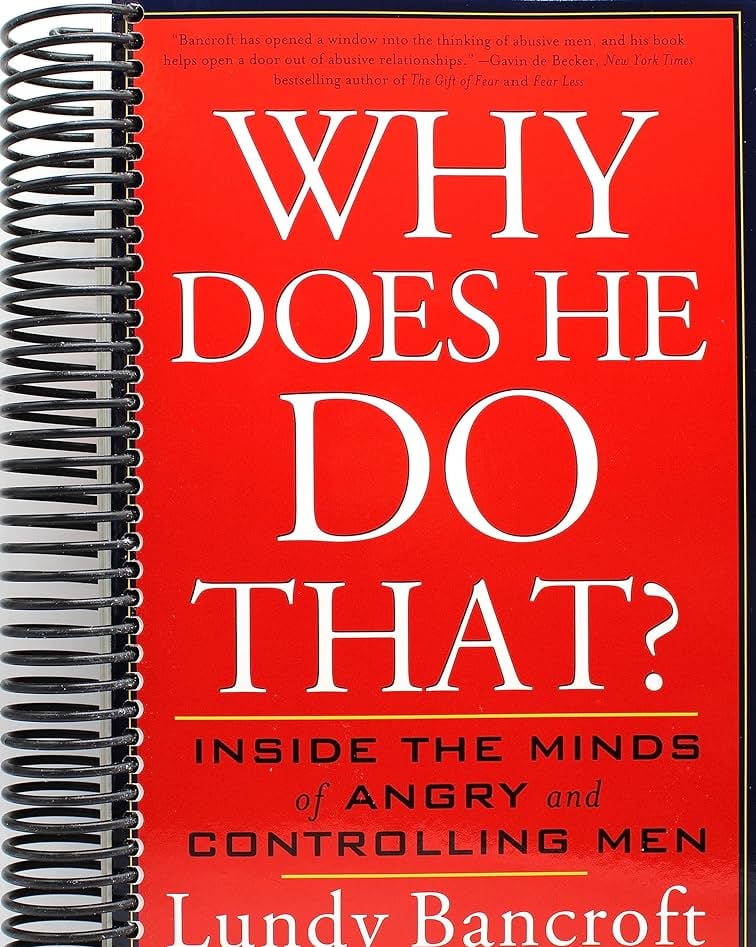Why Does He Do That?
It didn't happen overnight, but here you are trying to understand where his anger and controlling behavior came from.
RELATIONSHIPS
He’s two different people. I feel like I’m living with Dr. Jekyll and Mr. Hyde.
He really doesn’t mean to hurt me. He just loses control.
Everyone else thinks he’s great. I don’t know what it is about me that sets him off.
He’s fine when he’s sober. But when he’s drunk, watch out.
I feel like he’s never happy with anything I do.
He’s scared me a few times, but he never touches the children. He’s a great father.
He calls me disgusting names, and then an hour later he wants sex. I don’t get it.
He messes up my mind sometimes.
The thing is, he really understands me.
Why does he do that?
The Myths:
1. He was abused as a child.
A bad childhood doesn’t cause a man to become an abuser, but it can contribute to making a man who is abusive especially dangerous. But it is virtually unheard of for an abusive man to make substantial and lasting changes in his pattern of abusiveness as a result of therapy. It typically gets worse as he uses therapy to develop new excuses for his behavior, more sophisticated arguments to prove that his partner is mentally unstable, and more creative ways to make her feel responsible for his emotional distress.
2. His previous partner hurt him.
A man who was genuinely mistreated in a relationship with a woman would not be using that experience to get away with hurting someone else. It is fine to commiserate with a man about his bad experience with a previous partner, but the instant he uses her as an excuse to mistreat you, stop believing anything he tells you about the relationship and instead recognize it as a sign that he has problems with relating to women.
3. He abuses those he loves the most.
“Hurt people hurt people?” Wrong! Feelings do not cause behaviors. Our attitudes and habits determine our behaviors. Do they abuse everyone they love, or can they pick and choose who to be mean to?
4. He holds in his feelings too much.
Men are not boilers that overheat and explode. Most abusive men actually express their feelings more often than nonabusive men. So how did it build up and boil over then? He has a lack of empathy for your feelings and he explodes when he gives himself permission to.
5. He has an aggressive personality.
If a man’s problem was that he had an aggressive personality, he wouldn’t be able to reserve that side of himself just for you.
6. He loses control.
When things get broken, is it your stuff, his stuff or both? Who cleans up the mess? He can choose what to break and then he’s not remorseful enough to help clean up. Why didn’t he do something worse? Because he was in control.
7. He is too angry.
Cause and effect – The abuser is not abusive because he feels angry; he is angry because he is abusive.
8. He is mentally ill.
Their value system is unhealthy, not their psychology. The most extreme physical batterers- the ones who coke their partners to unconsciousness, who hold guns to their heads, who stalk and kill- have increased rates of mental illness BUT they can have a range of diagnoses. Mental illness doesn’t cause abusiveness any more than alcohol does; what he is doing is working well for him.
9. He hates women. Some woman must have hurt him.
Most abusers don’t hate women; they have a sense of superiority or contempt toward females. Men who are abused by their mothers do not tend to develop especially negative attitudes toward females; men who are abused by their fathers do.
10. He is afraid of intimacy and abandonment.
Women and men can be afraid of intimacy and abandonment but that’s no excuse for abuse.
11. He has low self-esteem.
This is a rewarding myth for the abuser; everyone caters to the poor guy with low self-esteem. How about your self-esteem when he’s abusing you? If low self-esteem isn’t an excuse for you to become abusive, then it’s no excuse for him either.
12. His boss mistreats him.
“Boss abuses man, man abuses woman, woman abuses children, children hit dog, dog bites cat.” If abuse causes abuse and that’s the excuse, then why don’t you do it? Plus, lots of abusive men have no boss at all.
13. He has poor skills in communication and conflict resolution.
He is not unable to resolve conflicts nonabusively; he is unwilling. Studies show abusers have normal abilities in conflict resolution, communication and assertiveness when they choose to use them.
14. There are as many abusive women as abusive men.
There are some men who are abused but most men who claim to be “battered men” are actually the perpetrators of violence, not the victims. Most exaggerate.
15. His abusiveness is as bad for him as for his partner.
Certainly abusing one’s partner is not a healthy lifestyle, but the negative effects don’t hold a candle to the emotional and physical pain, loss of freedom, self-blame, and numerous other shadows that abuse casts over the life of its female target. Abusive men can continue abusing for twenty or thirty years, and their careers remain successful, their health stays normal, their friendships endure.
16. He is a victim of racism.
A majority of abusive men are white, many of them well educated and economically privileged. If a man has experienced oppression himself, it could just as easily make him more sympathetic to a woman’s distress as less so. There are men of color among the most visible leaders in the US in the movement against women.
17. He abuses alcohol or drugs.
Alcohol cannot create an abuser and sobriety cannot cure one. And you are not “enabling” your partner to mistreat you; he is entirely responsible for his own actions.
The Reality:
1. He is controlling.
2. He feels entitled.
3. He twists things into their opposites.
4. He disrespects his partner and considers himself superior to her.
5. He confuses love and abuse.
6. He is manipulative.
7. He strives to have a good public image.
8. He feels justified.
9. Abusers deny and minimize their abuse.
10. Abusers are possessive.
Early Warning Signs (any of these counts, not all of them need to be present):
1. He speaks disrespectfully about his former partners.
2. He is disrespectful toward you.
3. He does favors for you that you don’t want or puts on such a show of generosity that it makes
you uncomfortable.
4. He is controlling.
5. He is possessive.
6. Nothing is ever his fault.
7. He is self-centered.
8. He abuses drugs or alcohol.
9. He pressures you for sex.
10. He gets serious too quickly about the relationship.
11. He intimidates you when he’s angry.
12. He has double standards.
13. He has negative attitudes toward women.
14. He treats you differently around other people.
15. He appears to be attracted to vulnerability.
When is it Abuse?
1. He retaliates against you for complaining about his behavior.
2. He tells you that your objections to his mistreatment are your own problem.
3. He gives apologies that sound insincere or angry, and he demands that you accept them.
4. He blames you for the impact of his behavior.
5. It’s never the right time, or the right way, to bring things up.
6. He undermines your progress in life.
7. He denies what he did.
8. He justifies his hurtful or frightening acts or says that you “made him do it.”
9. He touches you in anger or puts you in fear in other ways.
10. He coerces you into having sex or sexually assaults you.
11. His controlling, disrespectful, or degrading behavior is a pattern.
12. You show signs of being abused.
Traumatic Bonding:
Almost no abuser is mean or frightening all the time. At least occasionally he is loving, gentle and humorous and perhaps even capable of compassion and empathy. This intermittent, and usually unpredictable, kindness is critical to forming traumatic attachments. When a person, male or female, has suffered harsh, painful treatment over an extended period of time, he or she naturally feels a flood of love and gratitude toward anyone who brings relief, like the surge of affection one might feel for the hand that offers a glass of water on a scorching day. But in situations of abuse, the rescuer and the tormentor are the very same person. When a man stops screaming at his partner and calling her a” useless piece of shit,” and instead offers to take her on a vacation, the typical emotional response is to feel grateful to him. When he keeps her awake badgering her for sex in the middle of the night and then finally quiets down and allows her to get some of the sleep that she so desperately craves, she feels a soothing peace from the relief of being left alone. The nightmare of the experience the two of you have shared and are escaping from together is a dangerous illusion that trauma can cause.
Make a list of all the emotional ways you feel dependent on your partner, then make another list of big or small steps you might take to begin to become more independent. These lists can guide you in focusing your energy in the directions you need to go.
For more information about how to protect yourself, please see the Resources in the back of the book. “Why does he do that? Inside the minds of angry and controlling men” by Lundy Bancroft.






